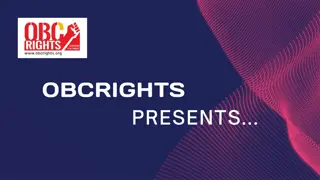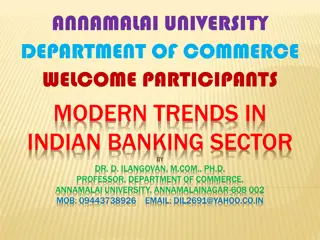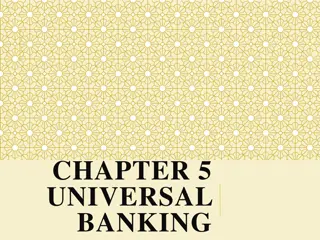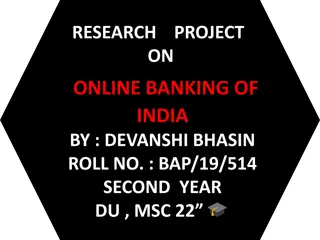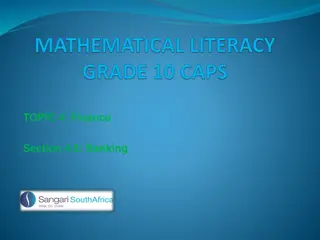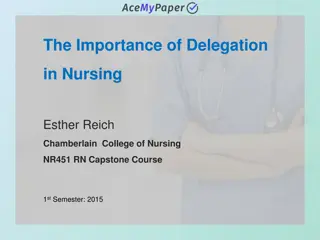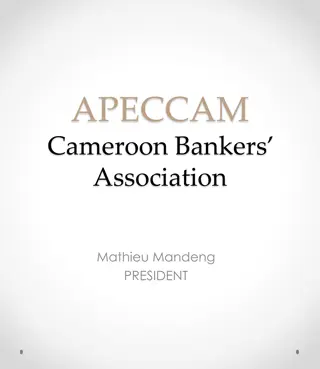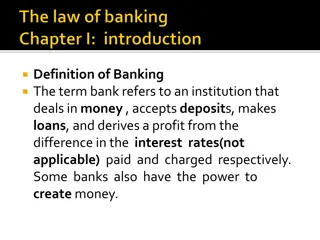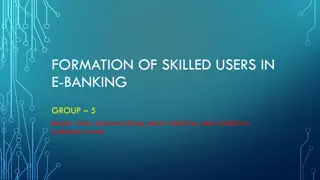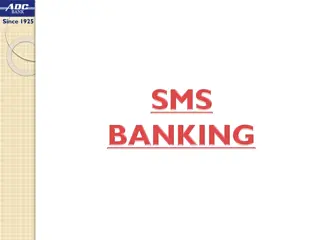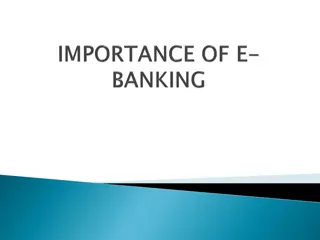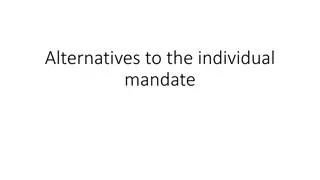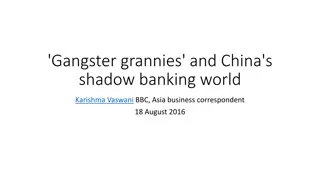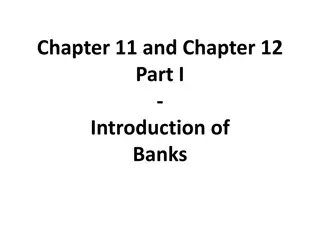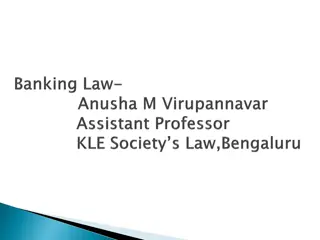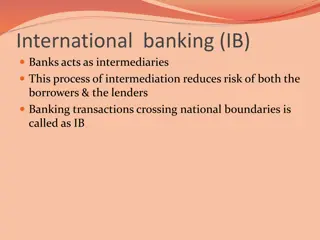Overview of Banking Industry Mandate by BASA Delegation to National Assembly Portfolio Committee
The Banking Association South Africa (BASA) advocates for its members with regulators, legislators, and stakeholders to enhance banking sustainability and contribute to social and economic development. The association represents commercial, mutual, and international banks, providing consultation on regulations, legislation, and consumer complaints. With a focus on protecting savings, banks in South Africa hold significant financial assets, including pensions and savings totaling R6.6-trillion.
Download Presentation

Please find below an Image/Link to download the presentation.
The content on the website is provided AS IS for your information and personal use only. It may not be sold, licensed, or shared on other websites without obtaining consent from the author. Download presentation by click this link. If you encounter any issues during the download, it is possible that the publisher has removed the file from their server.
E N D
Presentation Transcript
Presentation to the National Assembly Portfolio Committee on Tourism 01 June 2021
Introducing the BASA delegation Mr Hahangwivhawe Liphadzi SME Researcher The Banking Association South Africa Ms Bongi Kunene Managing Director The Banking Association South Africa Kgalaletso Tlhoaele Absa Head: Enterprise Development Retail & Business Bank Mr Glenn Pratt Standard Bank Personal & Business Banking SA / Small Enterprises Ecosystem Enablement / Manager: Sectors and Propositions Mr Khulekani Mathe Head: Financial Inclusion The Banking Association South Africa Elton Govender Enterprise Development Retail & Business Bank Jesse Weinberg FNB Head: SME Customer Segment Mr Muzi Mhlambi Manager, SME Portfolio The Banking Association South Africa Kirosha Governder Absa Group Regulatory Relations & Group Compliance 1
BASA Members Commercial Banks International Banks Mutual Banks Banks FinBond Bank GBS Mutual Bank Absa African Bank Al Baraka Bidvest Bank Capitec Discovery Bank First Rand Grindrod Bank Gro Bank Investec Ithala Bank Nedbank Post Bank Sasfin Standard Bank TymeBank Ubank Bank of China Bank of Taiwan BNP Paribas BofA Securities China Construction Bank City Bank Deutsche Bank Goldman Sachs Habib Overseas Bank HBZ Bank HSBC ICICI Bank JP Morgan Chase Societe Generale Standard Chartered State Bank of India 2
Overview of the Banking Industry Mandate The Banking Association South Africa (BASA) represents the interests of its members with regulators, legislators and stakeholders, to make banking sustainable, profitable and better able to contribute to the social and economic development and transformation of the country. Its members include commercial, mutual and international banks licensed to operate in South Africa. As an industry association, BASA: Consults its members on industry responses to proposed regulation, legislation and social issues. Does not intervene in the business and operations of individual members. o Banks account directly to their regulators. BASA is not a regulator. Refers consumer complaints to the independent Ombudsman for Banking Services. Subscribes to the Code of Good Banking Practice 3 Statistics are cumulative as at 8 May 2021
Protect savings Banks are custodians of the salaries and savings of South African workers, companies, professionals and the public sector. Pension funds and government are among those that trust banks to pay their money on demand. Banks hold R6.6-trillion rand of savings from the public Other borrowings 4% Bonds 6% Other liabilities 11% Deposits 71% Shareholder capital 8% Source: Reserve Bank 4
Facilitate payments Every payment of a salary, bank transfer or use of a card in a store is handled by banks and payments infrastructure. There are billions of transactions each year, managed seamlessly. R870-billion is handled every month in more than 100-million individual transactions. That is an average of R20-million every minute (Source: Bankserv) In the year to March 2020, banks reported 299,259 suspicious transactions to the Financial Intelligence Centre and 6-million transactions that breached cash deposit thresholds. (Source: Financial Intelligence Centre) 5
Work with regulators Banks work with regulators, primarily the Reserve Bank, to ensure the financial stability of the country and to protect savings. South Africa meets international standards, which is essential to interact with the international financial system and raise funds in the rest of the world. Under the Twin Peaks framework, the Prudential Authority, Financial Sector Conduct Authority, along with the National Credit Regulator, are among those that regulate the business and conduct of banks. 6
Finance economic growth Banks lend and invest money to finance investment and spending by South Africans. Jobs & Tax revenue Loans Investment Expanded economic capacity Two thirds of banks assets (shown left) are loans to the public (shown right). These loans finance the expansion of the economy. Central bank money and gold 3% Overdrafts, loans and advances (including to companies) 32% Other assets 12% Other loans 19% Government treasury bills 5% Listed and unlisted equities 1% Instalments and leases 10% Private sector bonds 2% Credit cards 3% Mortgages 33% Loans 67% Government bonds 10% Credit impairments -3% 8 Source: Reserve Bank
Access to credit South African banks have greater credit penetration than comparable markets. The credit market relies on the rule of law and property rights. Domestic credit to private sector by banks (% of GDP, 2019) 80.0 70.0 66.7 63.9 61.8 60.0 50.8 50.0 40.0 30.0 27.2 20.0 10.0 0.0 South Africa Turkey Brazil Poland Sub-Saharan Africa 9
Creating jobs and paying taxes The financial services sector pays 36% of all corporate tax (R122- billion in 2019) despite making up only 23% of GDP. The six largest banks employ almost 163,000 people: 168,000 167,000 166,000 165,000 The sector has increased employment by 50% since 2006 and now employs 2.3-million people, despite the increasing introduction of technology in their operations. 164,000 163,000 162,000 161,000 160,000 (StatsSA QLFS: Finance) 159,000 2013 2020 10
Importance of tourism sector to South Africa Tourism is a critical sector of the economy Provides 1.5 million indirect jobs The industry has 740,000 direct jobs Contributes R425 billion to GDP 80 percent are small businesses 11
The Portfolio Committee invited BASA to respond to the following: Various funding facilities available to tourism SMMEs, Qualifying criteria for various funding facilities, Challenges experienced by tourism SMMEs in accessing available funding, Assistance provided by the banks for SMMEs to meet the funding requirements, Suggestions to improve tourism SMME funding, Any other relevant information 12
1a. Various funding facilities 1. Tourism Sector has access to the same lending facilities as clients in other sectors 2. Standard Commercial Products: Overdrafts Commercial Asset Finance Term Lending Mortgage-Backed Business Loans Commercial Property Finance Government Credit Guarantees (e.g. Khula Credit Guarantee from SEFA) 3. COVID-19 Loan Guarantee Scheme. 4. Some banks have enterprise development programmes which provide co-funding and grants 5. Banks are deposit-taking institutions with a duty to extend credit in line with a multitude of risk mitigating regulation. 13
1b. Covid-19 LGS approvals by band number and value Band1 Band1 Band2 Band2 Band6 58 0% Un-categorised R 0.116 1% Un-categorised 51 0% Band5 428 3% Band1 R 0.370 2% Band3 Band3 Band6 R 0.789 4% Band4 710 5% Band4 Band4 Band1 1,454 10% Band5 Band5 Band3 1,495 10% Band6 Band6 Un-categorised Un-categorised Band5 R 3.743 20% Band2 R 6.402 35% Band2 10,749 72% Band4 R 2.972 16% [Band1] - Turnover > 0 and < R1 M [Band2] - Turnover >= R1 M and < R20 M [Band3] - Turnover >= R20 M and < R50 M [Band4] - Turnover >= R50 M and < R100 M [Band5] - Turnover >= R100 M and <= R300 M [Band6] - Turnover >= R300 M [Band1] - Turnover > 0 and < R1 M [Band2] - Turnover >= R1 M and < R20 M [Band3] - Turnover >= R20 M and < R50 M [Band4] - Turnover >= R50 M and < R100 M [Band5] - Turnover >= R100 M and <= R300 M [Band6] - Turnover >= R300 M Band3 R 3.959 22% LGS ALL PHASES - NUMBER OF APPROVALS BY BAND LGS LOANS BY BAND (VALUE IN BILLIONS) 14
1c. More on Covid-19 Loan Guarantee Scheme No turnover cap Max loan amount R100million Business must have been in good standing as at end Dec. 2019 Repayments required only after 13th Month Banks approved 14 827 loans to the value of R18,16 billion (as at 27 March) 15
2. Qualifying criteria Standard lending criteria applies to all SMME s not just tourism: Affordability assessments Business viability & sustainability Sound financial and business management skills Credit worthiness Secured & unsecured credit appetite 16
3a. Funding challenges faced by tourism SMMEs Reduced tourist activity, due to continued lockdowns. Variant of Coronavirus negatively affected international tourism Difficulty in preparing relevant business documentation required by finance providers Lack of collateral and mitigants to solve banking risk in funding Low awareness of funding opportunities available to SMMEs Lack of access to markets affects revenue and therefore profitability 17
3b. Awareness Lack of awareness of funding opportunities exacerbates problem of funding (McKinsey Report) Private and Public Sector should find ways to make individuals and businesses aware of different support measures available 18
3c. BASA awareness initiatives 1. Financial education divisions of banks together with BASA ran information campaigns on radio on different support measures on offer such as Payment holidays 2. BASA collaborated with SAIA to teach consumers:- What long term, short-term and credit life insurance for SMME s entails - through radio. Risk Management for SMME s Managing credit during the Covid-19 pandemic 19
4. Assistance provided by banks 1. Banks administered the South African Future Trust Processed R1.04 Billion, 9 656 SMME loans, to support 92 993 employees 2. Covid-19 Loan Guarantee Scheme (with SARB and National Treasury) 3. Payment holidays & moratoriums R33,6 billion in payment relief from April 20-Sept 20 Relief for 2.7 million individual credit agreements and 135 540 business 20
5a. Suggestions to improve Stimulate local demand, focus on local travel and safety. Opening up of travel globally is the long-term booster of tourism sector Government support is key to galvanizing SMEs post COVID-19 Government support could be in the form of relaxed levies, providing training and grants Synergy of government support initiatives through agencies like SEFA, SEDA that is sector-specific, is critical for impact Assessment and reform of laws impacting MSMEs - Output 5 of NISED Masterplan Simplify funding application process. Business development support initiatives. Corporates more generally could enable SMEs by focusing their supplier development for longer-term scale and competitiveness 21
5b. Suggestions to improve 1. Assistance to SMMEs should focus on: Providing targeted and sector-specific support for SMEs now and post crisis Drive innovation, research, and development Invest in the skills and capabilities that SMEs need at this time Boost the national entrepreneurship ecosystem 2. Tourism enterprises should also diversify their income streams by extending beyond the usual one product offering.(e.g. focus not just on leisure travel but also business) 3. They should also revisit their business models, for instance a stronger digital presence will be critical going forward 22
Conclusion 1. The Tourism Sector Recovery Plan COVID-19 Response plan recommends three strategic thrusts necessary to turn around the sector, these are: Re-Igniting Demand Rejuvenating Supply and Strengthening Enabling Capability. These are underpinned by ten strategic recommendations with specific actions, timeframes and accountabilities. Recovery is critical for improved bankability of the tourism businesses. The recovery of the tourism sector is linked to government s administration of the Covid-19 vaccine as this will stimulate the demand that drives the sector 2. 3. 4. 23




